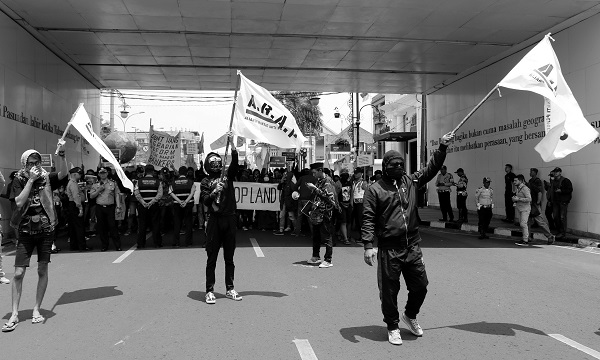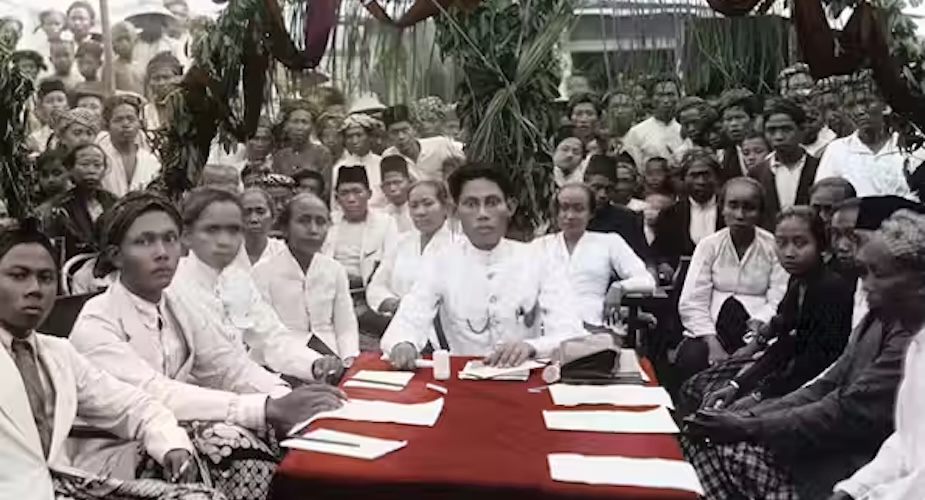Frans Ari Prasetyo
On 24 September 2018, hundreds of people demonstrated in front of Gedung Merdeka in Asia-Afrika Street, Bandung, West Java, where the Global Land Forum (GLF) 2018 was happening. This was the eighth gathering of the forum since the inaugural conference in Rome in 2003. The opening of the three-day event coincided with Indonesia’s National Peasants’ Day.
The GLF is a meeting of the International Land Coalition (ILC). Formed in 1995 as the Popular Coalition to Eradicate Hunger and Poverty with the World Bank as a founding member, today the ILC is a coalition of 206 member organisations from 64 countries. Over 1000 international delegates attended the conference in Bandung.
The choice of Indonesia as the venue for the eighth conference was not without reason. Under Jokowi’s administration Indonesia is pushing forward an agrarian reform agenda. The selection of Bandung was also significant. As the site for the 1955 Asia-Africa conference (Konferensi Asia Afrika, KAA), the GLF organisers sought to invoke the spirit of that gathering, including its stated values of anti-colonialism and anti-liberalism.
Some local organisations refused to attend the meeting, including the People’s Alliance against Eviction (Aliansi Rakyat Anti Penggusuran: ARAP), which sees the GLF as sanctioning land grabbing, eviction and pushing a neoliberal land policy. This opposition is based on their experiences in Bandung itself. Under Mayor Ridwan Kamil’s administration (2013-2018) (who is now governor of West Java), the group fought against the evictions of at least four urban kampungs. All failed.
Another kampung is now facing the threat of eviction as the government seeks to implement its policy of urban kampung conversion, vacating these areas for commercial and property developments. In the East Bandung area the conversion of one extensive area of productive agricultural land is underway to make way for a property development named Bandung Technopolis.
The National Slum Upgrading project known as the Kotaku program (Kota Tanpa Kumuh) was introduced by Jokowi’s administration in 2015-2019, funded by loans from the Asian Infrastructure Investment Bank (AIIB) and the World Bank with the promise of achieving access to potable water, zero slums, and 100 per cent access to sanitation. For many living in these areas it has instead led to disempowerment and made their lives more precarious. The majority of urban villagers have little income or political bargaining power and, crucially, do not have land certificates, because the land was obtained from an historical or informal transaction.
In 2017, a coalition of national NGOs, the Civil Society Coalition for Monitoring Indonesia’s Infrastructure Development warned, ‘For civil societies, this Kotaku program potentially violates the basic rights of citizens, and causes the poorest people to become poorer than before.’
In Indonesia peasants, fishers and urban-rural poor face major inequalities relating to land ownership, land governance and land distribution. Groups supporting the peasants, fishers and urban-rural poor do not believe this regulation will solve their problems. The Agrarian Reform Program no longer aims to reduce inequality of land tenure, let alone abolish land control monopolies. The question asked by activists is, ‘What is the aim and who is the agrarian reform program in Indonesia for?’
ARAP and its supporters instead sought to affirm the principles of anti-colonialism and anti-imperialism contained in spirit of the 1955 Asian-African Conference, as a basis for rejecting land annexation, evictions and what they deemed to be neoliberal land policy.
In the following photo essay, I try to capture the momentum of the ‘anti-GLF’ and ‘anti-World Bank’ protest carried out by ARAP to demonstrate to the public their concerns regarding land distribution, food and property and in solidarity with the peasants and urban-rural poor who have experienced segregation, land gentrification and violence.
Protest in pictures

The protest commenced at 8am on Lengkong Street with a two-kilometre march to Asia Afrika Street. The marchers arrived at the Gedung Merdeka at around 10.30am. I went along with them, with my DSLR camera and long lens that I had not used for a long time due to its weight. Seeing this change back to DSLR, several friends including journalists who have known me well as fellow street photographers said, ‘Finally, that camera is out of its cage.’
‘This is a special moment that must be well documented,’ I replied. They laughed as they walked with banners in hand towards the conference building.

The People’s Alliance Against Eviction (Aliansi Rakyat Anti Penggusuran, ARAP) released a statement declaring the ‘10 People’s Principles Against Land Grabs, Eviction and the Neo-liberalism Global Land Policies’. It carried the slogan ‘Let a New World be born in Bandung for genuine land reform, not land grabs!’
As they marched along the route the demonstrators held up banners and posters and distributed flyers and stickers all carrying their statement of principles and slogans. Protesters dressed in black and covered their faces.

The ARAP protest attracted the attention it had hoped for. Hundreds of police lined the route. Many GLF participants emerged from the conference to ask questions. The demonstrators dispersed peacefully at 2pm.

Frans Ari Prasetyo (fransariprasetyo@gmail.com) is an independent researcher and photographer who lives in Bandung. His interests are the evolution of urban politics, culture and sub-cultures, artists and underground activists.















